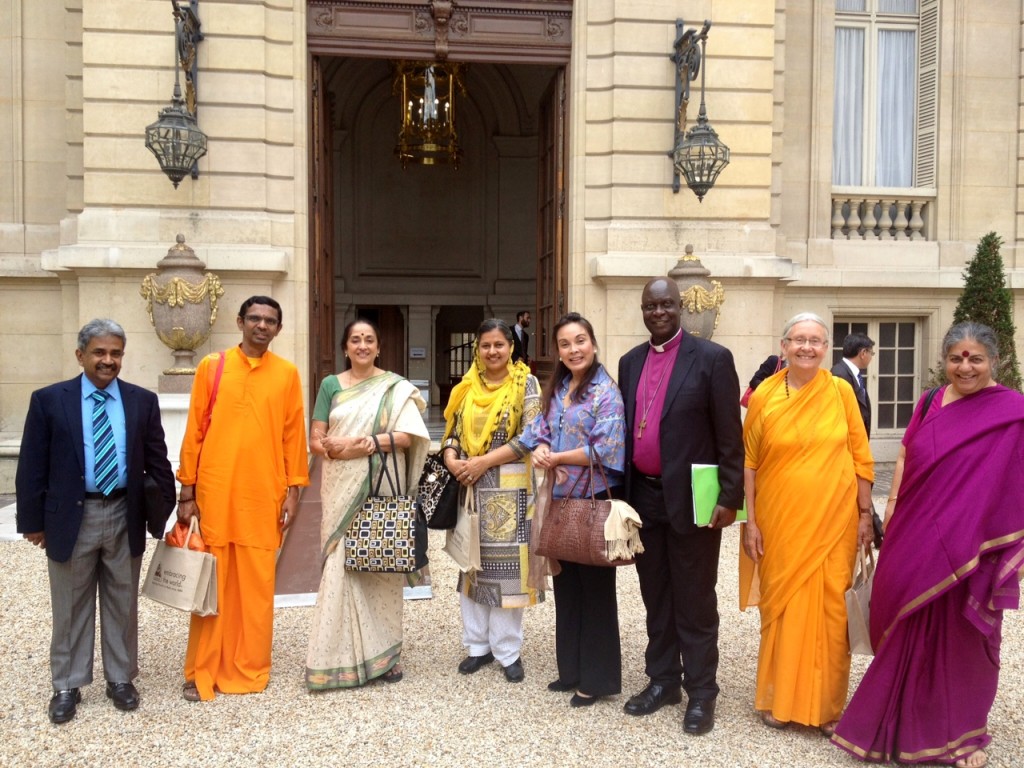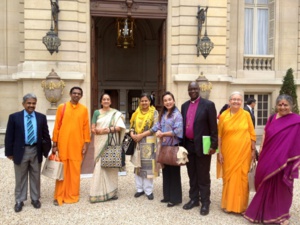Religion has joined the war effort on Climate Change. In a one day event titled Summit of Conscience for the Climate organized in Paris, earlier this week, religious leaders and “moral” thinkers attended the gathering so as to mobilise action before the commencement of the COP 21 conference, scheduled to take place in Paris, later this year.
“The single biggest obstacle to changing course [over climate change] is our minds and hearts,” said Cardinal Peter Turkson, an adviser for Pope Francis’ encyclical on climate change.
“Our prayerful wish is that governments will be as committed at COP 21 as we are here,” said Turkson, president, Pontifical Council for Justice and Peace. He is also one of the advisers for Pope Francis’ encyclical on climate change.
Themed “Why Do I Care”, the summit drew participants from across faiths and movements, including, Hinduism, Buddhism, Judaism, Christianity, and Islam.
Indigenous communities, activists and government representatives also joined in and called for an end to the “throw-away consumerist culture” which causes “disastrous indifference to the environment”. That is Turkson put it.
“The single biggest obstacle to changing course is our minds and hearts,” he said. He further went on to add that “climate change is being borne by those who have contributed least to it”.
This summit was used for two distinct purposes. One is to highlight an international “Call to Conscience for the climate” while the second is to launch a new organisation called ‘Green Faith in Action’, which is aimed at creating increasing awareness vis-à-vis issues concerning sustainable development and the environmental.
Participants drafted a letter which was signed by the Prince Albert II of Monaco, Sheikh Khaled Bentounès, Rajwant Singh, director of an international network called Eco Sikh, Nigel Savage, president of the Jewish environmental organisation Hazon, Sufi Master of the Alawiya in Algeria, as well as by other summit speakers. This will be provided to all 195 state parties attending the COP21 event.
The letter is a reflection of challenges faced by indigenous communities as well as concerns raised by religious group and faith leaders. For example, many indigenous communities have faced attack on their territories and their way of life because of the petroleum industry.
“We’re not some kind of folkloric tradition, we’re living beings,” said Valdelice Veron, spokesperson for the Guarani-Kaoiwa people of Brazil. She delivered her speech wearing a traditional dress.
She along with other indigenous delegates spoke of the practice of mono-culture is decimating the local ecology.
“We’re here because we want the voices of indigenous people to be heard,” said Patricia Gualinga, a representative of the Serayaku community in the Amazonic part of Ecuador. “We share all the concerns about the climate and we too are being affected in many different ways,” she said.
“Climate change should be considered as an opportunity – for business, technology, [and other sectors]. We need to pave the way together,” said Ségolène Royal, the French Minister for Ecology, Sustainable Development and Energy.
Source: ipsnews.net
“The single biggest obstacle to changing course [over climate change] is our minds and hearts,” said Cardinal Peter Turkson, an adviser for Pope Francis’ encyclical on climate change.
“Our prayerful wish is that governments will be as committed at COP 21 as we are here,” said Turkson, president, Pontifical Council for Justice and Peace. He is also one of the advisers for Pope Francis’ encyclical on climate change.
Themed “Why Do I Care”, the summit drew participants from across faiths and movements, including, Hinduism, Buddhism, Judaism, Christianity, and Islam.
Indigenous communities, activists and government representatives also joined in and called for an end to the “throw-away consumerist culture” which causes “disastrous indifference to the environment”. That is Turkson put it.
“The single biggest obstacle to changing course is our minds and hearts,” he said. He further went on to add that “climate change is being borne by those who have contributed least to it”.
This summit was used for two distinct purposes. One is to highlight an international “Call to Conscience for the climate” while the second is to launch a new organisation called ‘Green Faith in Action’, which is aimed at creating increasing awareness vis-à-vis issues concerning sustainable development and the environmental.
Participants drafted a letter which was signed by the Prince Albert II of Monaco, Sheikh Khaled Bentounès, Rajwant Singh, director of an international network called Eco Sikh, Nigel Savage, president of the Jewish environmental organisation Hazon, Sufi Master of the Alawiya in Algeria, as well as by other summit speakers. This will be provided to all 195 state parties attending the COP21 event.
The letter is a reflection of challenges faced by indigenous communities as well as concerns raised by religious group and faith leaders. For example, many indigenous communities have faced attack on their territories and their way of life because of the petroleum industry.
“We’re not some kind of folkloric tradition, we’re living beings,” said Valdelice Veron, spokesperson for the Guarani-Kaoiwa people of Brazil. She delivered her speech wearing a traditional dress.
She along with other indigenous delegates spoke of the practice of mono-culture is decimating the local ecology.
“We’re here because we want the voices of indigenous people to be heard,” said Patricia Gualinga, a representative of the Serayaku community in the Amazonic part of Ecuador. “We share all the concerns about the climate and we too are being affected in many different ways,” she said.
“Climate change should be considered as an opportunity – for business, technology, [and other sectors]. We need to pave the way together,” said Ségolène Royal, the French Minister for Ecology, Sustainable Development and Energy.
Source: ipsnews.net


 Cutting across religions, leaders of Faith call for a “Call to Conscience” on Climate Change
Cutting across religions, leaders of Faith call for a “Call to Conscience” on Climate Change





 Companies
Companies